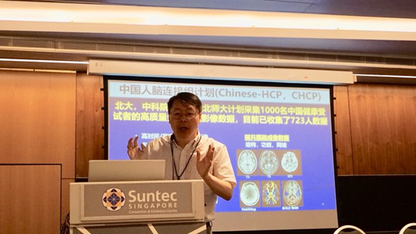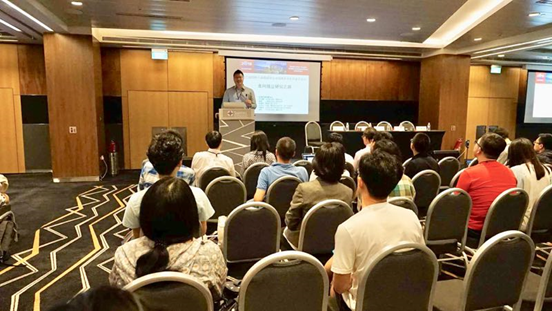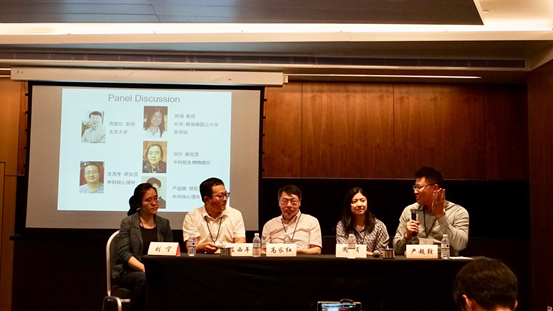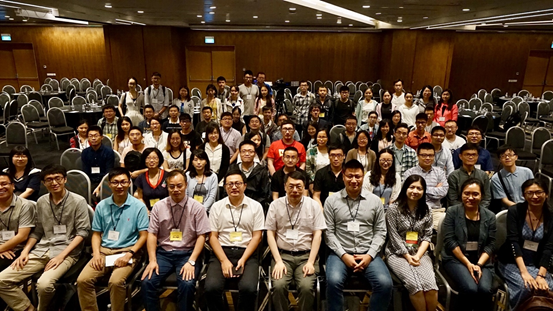|
The Annual Event of Chinese Young Scholars for Human Brain Mapping was held on June 19th, during the 2018 OHBM Annual Meeting in Singapore. This was the second annual event, and continued the success from the inaugural meeting in Vancouver. The theme for this year’s event was “The Road to Independence”. Around 200 young scholars from universities around the world participated. The annual event is committed to bringing together young Chinese researchers from a wide variety of backgrounds to share and discuss their professional expertise and career experiences, as well as any challenges they may have faced. This offered a platform for young researchers to build collaborations on cutting-edge neuroscience topics and methods, and also to learn from senior researchers on the route to a successful scientific career.  The Road to Independence - by Roselyne Chauvin The Road to Independence - by Roselyne Chauvin This year’s schedule commenced with a brief review of the annual event by one of the organisers: Professor Chaogan Yan. Then, Professor Yan introduced the two guest speakers: Professor Jiahong Gao (Director of the MRI Research Center of Peking University, Chair Elect of OHBM), and Professor Xinian Zuo (Director of the MRI Research Center, Institute of Psychology, Chinese Academy of Sciences, Program Committee Chair elect of OHBM).  Professor Jiahong Gao discusses the opportunities for brain imaging in China. Professor Jiahong Gao discusses the opportunities for brain imaging in China. Professor Jiahong Gao gave the first talk, entitled “ Brain Imaging in China: Opportunities and Challenges”. He summarized the fast development of human brain mapping research in China, and shared his vision on future directions of this field in a humorous way. Taking the latest advances on Magnetoencephalography development in his lab for instance, Professor Gao discussed the challenges and opportunities we face in brain imaging, and encouraged young scientists to seize the opportunities and bravely climb to the scientific peak. The second speaker was Professor Xinian Zuo from the Institute of Psychology at the Chinese Academy of Sciences. In his talk titled “From Mathematics to Brain Sciences”, Professor Zuo shared his own career experiences, from a PhD in mathematics to becoming an outstanding independent researcher in human brain science. He particularly emphasized the importance of reliability and reproducibility in brain imaging studies, and briefly introduced several ongoing projects by his team, including the Chinese Color Nest Project and the Traveler Project. After the two keynote talks, Professor Juan (Hellen) Zhou from Duke-NUS Medical School, and Professor Ning Liu from the Institute of Biophysics at the Chinese Academy of Sciences joined the guest speakers for a panel session. Professor Chaogan Yan moderated the discussion, and introduced several topics under this year’s focus “The Road to Independence”, including relationships with tutors, necessity of career planning and recovery from failures. Each senior researcher shared their insights on these questions. Professor Jiahong Gao provided advice on these topics based on his own experiences. He pointed out that the extent of independence of a young scholar largely depends on the mentors’ style. Professor Gao encouraged young scholars to develop their skills with support from mentors, and to prepare themselves to become independent researchers. Young scholars should set spiritual goals, make plans to achieve them, and learn lessons from their consistent efforts. Professor Xinian Zuo shared his insights based on his personal experiences of switching from mathematics to neuroimaging, and echoed Professor Gao that young scholars would better seek support from their mentors and develop the ability for independent research in projects with their mentors. He also shared his “failure” stories about manuscript writing and paper submission during his very early projects. He summarized that failure is not terrible, and that one should learn lessons from what he/she had experienced, and aim to improve from them. Professor Juan (Hellen) Zhou shared her personal study experiences, and emphasized the importance of independence, as well as hard work and persistence in order to become a successful researcher. She provided the example of her public speaking training during her PhD, emphasizing the critical role of hard work for acquiring professional skills. She also advised that one could obtain power and motivation from setbacks, and should move forward towards one’s ultimate goal. Professor Ning Liu provided her thoughts based on how she got along with her own students. She pointed out that unstructured ‘light-touch’ supervision would not be suitable for all students, and she suggested to supervise each student with specific proper strategies. She also discussed the special difficulties associated with animal studies, and encouraged young scholars to actively adapt to any difficulties or potential failures, and keep being positive towards their goals. Professor Chaogan Yan talked about his personal “failure” when attempting to switch from neuroimaging studies using fMRI to animal studies, and how he subsequently adjusted his research direction back to human neuroimaging. He pointed out that it could be a big challenge to move to completely new fields for a PhD or postdoc. But he believed that it may still be worth trying, especially if you are keen on the new questions and are still young. Even if there was a high chance of failure, one could learn valuable lessons from these unforgettable experiences. Towards the end of the panel session, Professor Jiahong Gao provided his answers to the questions from audience on how to get international impact as local scholars in mainland China and how to publish papers in high-impact journals. He encouraged young scholars to perform high-level studies in the field, and to actively communicate research results with international researchers and journal editors. He mentioned that “the point is not that we cannot publish high-impact papers, instead it’s that we have not yet achieved high-impact research results.” He continued, “we should cherish our time, and work hard, to pursue critical questions in the field. Only in this way, can we achieve influential results, and publish papers in high-impact journals, which will lead others to recognize our research capability.”
At the end, the audience thanked the speakers for their informative presentations and discussions with hearty rounds of applause. We took group pictures to conclude this inspiring and memorable event. After the meeting, we enjoyed a group dinner and more informal discussions on both science and life as a scientist. Organizing Committee of the Annual Event of Chinese Young Scholars for Human Brain Mapping: Chao-Gan Yan, Institute of Psychology, Chinese Academy of Sciences Yuan Zhou, Institute of Psychology, Chinese Academy of Sciences Rui-Bin Zhang, Department of Psychology, The University of Hong Kong Xiang-Zhen Kong, MPI für Psycholinguistik Chun-Yu Liu, State Key Laboratory of Cognitive Neuroscience and Learning, Beijing Normal University Xiao Chen, Institute of Psychology, Chinese Academy of Sciences
0 Comments
Your comment will be posted after it is approved.
Leave a Reply. |
BLOG HOME
Archives
January 2024
|



 RSS Feed
RSS Feed